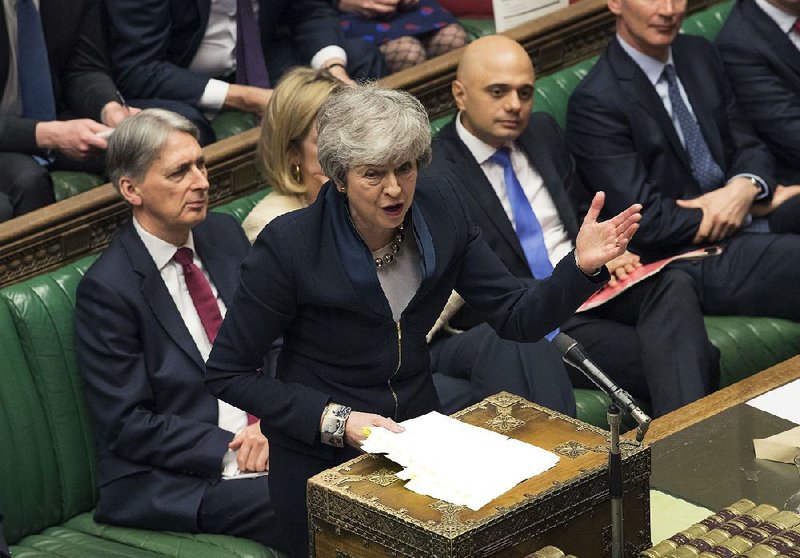LONDON -- Prime Minister Theresa May and Britain's main opposition party sought a compromise Wednesday to prevent an abrupt British departure from the European Union at the end of next week.
In an about-face, May sought to forge an agreement with leftist Labor Party leader Jeremy Corbyn after failing three times to win Parliament's backing for her withdrawal deal.
May also said she would ask the EU for a delay in Britain's departure date -- postponed once already -- to avert a chaotic and economically damaging no-deal exit on April 12.
"The country needs a solution, the country deserves a solution, and that's what I'm working to find," May told lawmakers before meeting with Corbyn for about two hours.
Afterward, both the government and Labor Party called the meeting "constructive" and said their teams would hold more in-depth talks today.
May's office said both sides had shown "flexibility and a commitment to bring the current Brexit uncertainty to a close."
But Corbyn said that "the meeting was useful but inconclusive."
"There hasn't been as much change as I expected," he said.
Labor lawmaker Paul Sweeney said May's outreach to his party "shows the desperation that she's in." He said May wanted Labor "to bail her out of a position she's dug herself in."
May's cross-party talks came amid EU warnings that a damaging withdrawal without a plan was growing more likely by the day.
After lawmakers three times rejected an agreement struck between the bloc and May late last year, the leaders of the 27 EU countries that will remain in the bloc postponed the original March 29 exit date and gave the U.K. until April 12 approve the divorce deal or come up with a new one.
But the U.K.'s House of Commons has not been able to find a majority for any alternative plan.
"A no-deal on 12 April at midnight looks more and more likely," European Commission President Jean-Claude Juncker said Wednesday, adding that such an exit would cause disruptions for EU citizens and businesses, but much worse economic damage for Britain.
EU Economy Commissioner Pierre Moscovici said a no-deal exit would mean long lines at borders and paperwork headaches for customs checks on the 11,000 vehicles entering and leaving Britain each day.
"I prefer strict controls at the price of a few lines of trucks to a health crisis or illegal trafficking," he said. "The security of Europeans will be our top priority."
May's move to negotiate with the Labor Party points Britain toward a softer exit than the one she has championed since British voters decided in June 2016 to leave the EU. Labor wants the U.K. to remain in the EU's customs union -- a trading area that sets common tariffs on goods entering the bloc while allowing free trade in goods moving between member states.
May has always ruled that out, saying it would limit Britain's ability to forge an independent trade policy.
May's decision to negotiate with Corbyn is risky for both her Conservatives and for Labor, and it could widen divisions that run through both parties.
Labor is formally committed to enacting the voters' decision to leave the EU, but many of the party's lawmakers want a new referendum that could keep Britain in the bloc.
Meanwhile, May's move infuriated anti-EU Conservatives who say Britain must make a clean break with the bloc in order to take control of its laws and trade policy.
Former Foreign Secretary Boris Johnson said Britain's withdrawal "is becoming soft to the point of disintegration." Ex-Conservative leader Iain Duncan Smith said he was "absolutely appalled" by May's talks with Corbyn.
Junior Wales Minister Nigel Adams quit his post, criticizing May for seeking a deal with "a Marxist who has never once in his political life put British interests first" -- a reference to the leftist Corbyn.
He was followed by junior exit minister Chris Heaton-Harris, who said in his resignation letter that the government "should have honored the result of the 2016 referendum" and left the EU last Friday.
Meanwhile, pro-EU lawmakers were not banking on talks between May and Corbyn succeeding.
The House of Commons on Wednesday approved a bill to ensure May can't go back on her promise to seek a delay rather than let Britain tumble out of the bloc.
The bill, debated and approved in a single day, compels May to seek to extend the exit process beyond April 12 to prevent a no-deal departure. The bill passed by a single vote, 313-312.
The bill still needs approval from the House of Lords, Parliament's unelected upper chamber. And it does not force the EU to agree to delay Britain's withdrawal.
EU leaders gave a cautious welcome to May's attempt at rapprochement.
German Chancellor Angela Merkel said she would work "until the last hour" to secure an orderly withdrawal, but she stressed that "these solutions have to be reached above all in Britain itself."
Information for this article was contributed by Danica Kirka and Geir Moulson of The Associated Press.
A Section on 04/04/2019
